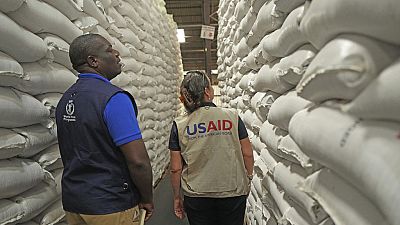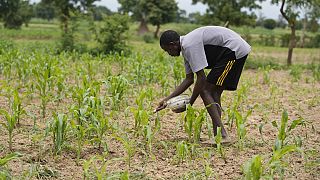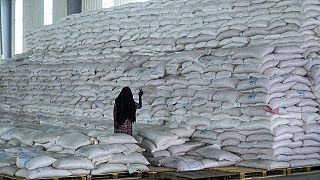Zimbabwe
The United Nations World Food Program said Wednesday it was working with Zimbabwe's government and humanitarian agencies to provide food to 2.7 million villagers in the country, as the El Niño weather phenomenon contributes to a drought crisis in southern Africa.
Food shortages, which put almost 20% of Zimbabwe's population at risk of famine, are caused by poor harvests in drought- ravaged areas, where people rely on small-scale agriculture for food. El Nino is expected to further worsen this situation by causing below-average rainfall again this year, said Francesca Erdelmann, WFP country director for Zimbabwe.
El Nino is a natural, recurring weather phenomenon that warms parts of the Pacific, affecting weather patterns around the world. This has different impacts depending on the region. When rains fail or arrive late, it has a significant impact, Erdelmann said at a news conference.
In Zimbabwe, January to March is considered the lean season, when rural households lack food while waiting for the next harvest. More than 60% of Zimbabwe's 15 million people live in rural areas. Their lives are increasingly affected by a cycle of drought and floods made worse by climate change.
Periods of drought are becoming longer and more severe. For decades, Zimbabwe's rainy season ran reliably from October to March. It has become irregular in recent years, sometimes starting only in December and ending earlier.
Once a food exporter, Zimbabwe has relied heavily on donor aid to feed its population in recent years. Agricultural production also fell sharply after the seizure of white-owned farms under former President Robert Mugabe starting in 2000, but it has begun to recover.
The United States Agency for International Development, the U.S. government's foreign aid agency, has estimated, through its network of famine early warning systems, that 20 million people in Africa Australia will need food aid between January and March. Many people living in areas of greatest concern, such as Zimbabwe, southern Malawi, parts of Mozambique, and southern Madagascar, will not be able to feed themselves until early 2025 because of El Niño, USAID said.
Erdelmann said WFP received an $11 million grant from USAID.
Zimbabwe's government says the country has grain reserves to last until October, but it has acknowledged that many people who have failed to harvest enough grain and are too poor to buy food on the markets are in dire need of help.
Prices of basic food items are skyrocketing across the region, USAID said, further impacting people's ability to feed themselves.
Zimbabwe has already acknowledged feeling the effects of El Nino in other areas after 100 elephants died in a drought-hit wildlife park late last year.













01:24
South Sudan: World Food Programme airdrops food, warns of famine
01:49
Sudanese refugees in Chad face deepening humanitarian crisis
01:42
Gaza residents welcome rare organized aid delivery after months of chaos and hunger
01:15
Morocco says 2024 was the hottest year with temperatures reaching 47.7 degrees
02:00
Refugees in Kenyan camp face hunger after USAID funding freeze
01:41
UN warns of looming famine in Sudan, Gaza and 3 other global hunger hotspots